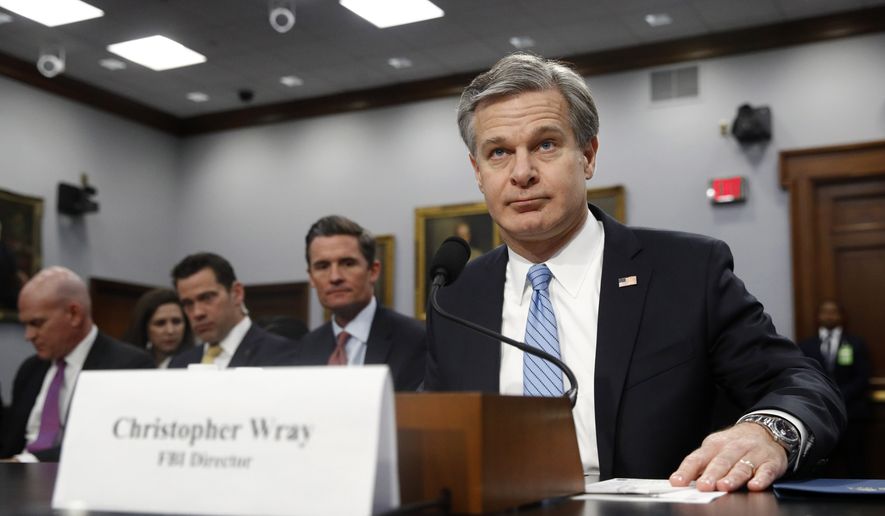White supremacists pose a “persistent, pervasive” threat, FBI Director Christopher Wray testified Thursday on Capitol Hill.
Mr. Wray made the remark during a budget request hearing held before the House Appropriations Committee during an exchange with the panel’s chairman, Rep. José E. Serrano, New York Democrat.
“How would you describe the danger to public safety as posed by white supremacist extremism?” asked Mr. Serrano. “What is the danger to the country and what do you need to fight it?”
“The danger, I think, of white supremacists, violent extremism or another kind of extremism is of course significant. We assess that it is a persistent, pervasive threat,” Mr. Wray responded.
The FBI handles related investigations through the bureau’s joint terrorism task forces as well as through its civil rights program by enforcing federal hate crime statutes, Mr. Wray continued, noting the 29 guilty counts prosecutors secured last month against James Alex Fields Jr., the Ohio man convicted of murdering a counterprotester during a 2017 rally organized by white nationalists in Charlottesville, Virginia.
“I think as to whether I would see any significant difference or trend there, or whether it’s changing, I think I would say in general, domestic terrorism in this country has changed in the sense that it is less structured, less organized, fewer groups, more uncoordinated one-off individuals as opposed to some structured hierarchy, and that presents its own share of challenges,” Mr. Wray added.
Concerns related to the threat posed by violent extremists, including white nationalists and white supremacists in particular, have rekindled in light of a self-described racist, ethno-nationalist from Australia taking credit for a mass-shooting that claimed the lives of dozens of Muslims last month in nearby Christchurch, New Zealand.
Commenting on the shooting hours later, President Trump told reporters that does not believe white nationalists pose a major threat to the United States.
“I don’t really,” said Mr. Trump. “I think it’s a small group of people that have very, very serious problems.”
Fewer than one-in-five Americans surveyed afterward said that they believe Mr. Trump personally opposes white nationalism.
Facebook has since introduced new policies prohibiting the explicit praise or promotion of white nationalism and white supremacy on both its flagship social network and Instagram photo-sharing service, and the House Judiciary Committee has scheduled a hearing for next Tuesday to examine the rise of white nationalism and its connection to social media.
Hate crime incidents reported to the FBI increased in 2017 for the third straight year, Mr. Serrano noted during the hearing. Statistics for 2018 are not yet available.
“We are determined not to tolerate hate-filled violence in our communities, so we’re going to aggressively investigate those cases,” Mr. Wray said Thursday, CNN first reported.
• Andrew Blake can be reached at ablake@washingtontimes.com.




Please read our comment policy before commenting.